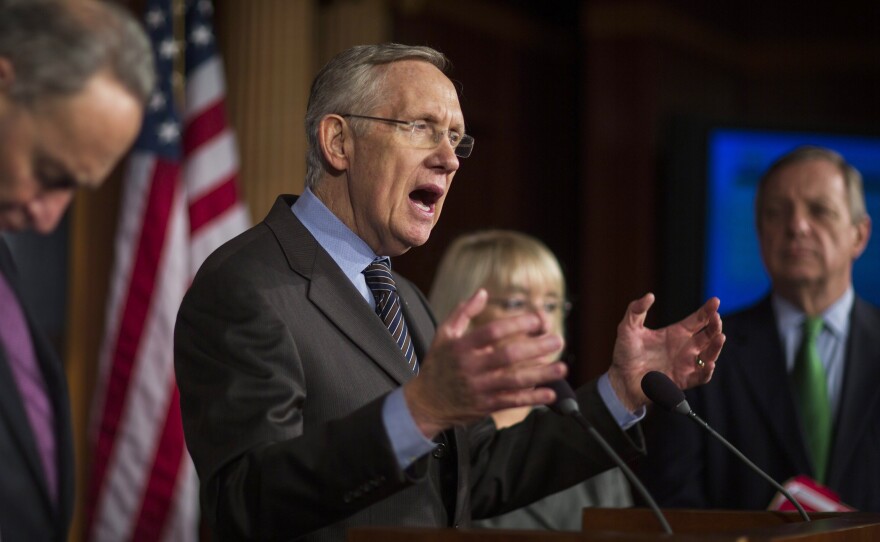
The political class was aflame Thursday with outrage (Republicans) and triumph (Democrats) as Senate Democrats voted to hem in the minority party's ability to filibuster most presidential nominees.
By a 52-48 vote, the Democratic-controlled Senate carried out the so-called nuclear option. The leadership will now allow a simple majority of senators to override filibusters on nominations, with the exception of those to the Supreme Court.
Previous precedent, in place since the 1970s, required a 60-vote "supermajority" to end a filibuster.
For some, the development -- long in incubation but hatched over the GOP's repeated filibusters of White House judicial nominees -- marked a change of monumental proportions.
And while it no doubt has intensified the partisan war that has been raging unabated on Capitol Hill, there are some, like historian Gregory Koger, who see the developments as a natural result of majority party frustration and consistent with action available under Senate rules.
We spoke with Koger, author of Filibustering: A Political History of Obstruction in the House and Senate, just after the Senate took its historic vote. Here's what he had to say:
NPR: If you were writing a new chapter on today's vote, what title would you use?
Koger: To me, the biggest headline is that you finally observed a simple majority of the Senate frustrated enough to make a real change in how the Senate operates.
NPR: But what will this mean for the Senate?
Kroger: In a strange sense, nothing has really changed. The Senate majority has always been able to do this. What's changed is that a Senate majority got frustrated enough to restrict filibusters by the minority. It's actually happened before, but it's extremely rare.
NPR: Republicans are warning that Democrats will live to regret this -- how might that play out?
Koger: In the short to medium term, I don't expect much blowback except some visible opposition from Republicans on other issues -- the budget, farm legislation. But today's action would only have a significant impact if Senate and House Republicans were inclined to strike a grand bargain, which, based on the experience of the last 2 1/2 years, doesn't seem likely.
NPR: So, what are the "retaliation" options for Senate Republicans?
Koger: Since 2005, we've called this the "nuclear option" because the minority party typically threatens to retaliate. But to do that, they would have to filibuster more than they already are. And right now, the minority party filibusters in every case when the benefits outweigh the costs, just as a normal course. If they were to retaliate, they would have to start filibustering when the costs exceed the benefits. I don't expect that to happen very much. I think the difference will be close to zero.
NPR: But what happens when a day comes that Senate Democrats are in the minority, and a Republican White House is sending nominations?
Koger: I don't know that Democrats in that hypothetical future will be filibustering as much as the Republicans. Why? They usually chicken out. When the roles were reversed during President [George W.] Bush's first term, the Republicans usually were able to find enough Democrats to get their agenda through.
NPR: Why?
Koger: In the Senate, the Democratic Party, majority or minority, has to include a number of red state Democrats, like Joe Manchin of West Virginia and Mark Pryor of Arkansas. [Manchin and Pryor joined Republicans in voting
Thursday against the nuclear option.] They have a tough time defending Democratic positions in their home states. That makes it tough to maintain a united front.
NPR: What does this say about the state of the Senate? Was this inevitable?
Koger: I think, yes, it was inevitable given the combination of public awareness that filibustering is possible and the increasing partisanship in American politics. When you put those two together, you get the conservative party base and conservative organizations that expect obstruction of any proposal by the White House. If Republicans had failed to filibuster, or backed down, they would have faced a great deal of disappointment from the conservative base for blinking.
NPR: Could you put this in some historical perspective?
Koger: Let's be clear -- this will reduce the number of filibusters against presidential nominations. But, more importantly, what's happened today is that we've carved out a fairly significant segment of the Senate agenda and said, henceforth, you can filibuster, but it will take a simple majority to cut it off. It continues a long trend of allowing obstruction, but narrowing the range of agenda items that are subject to obstruction.
Copyright 2013 NPR. To see more, visit www.npr.org.






